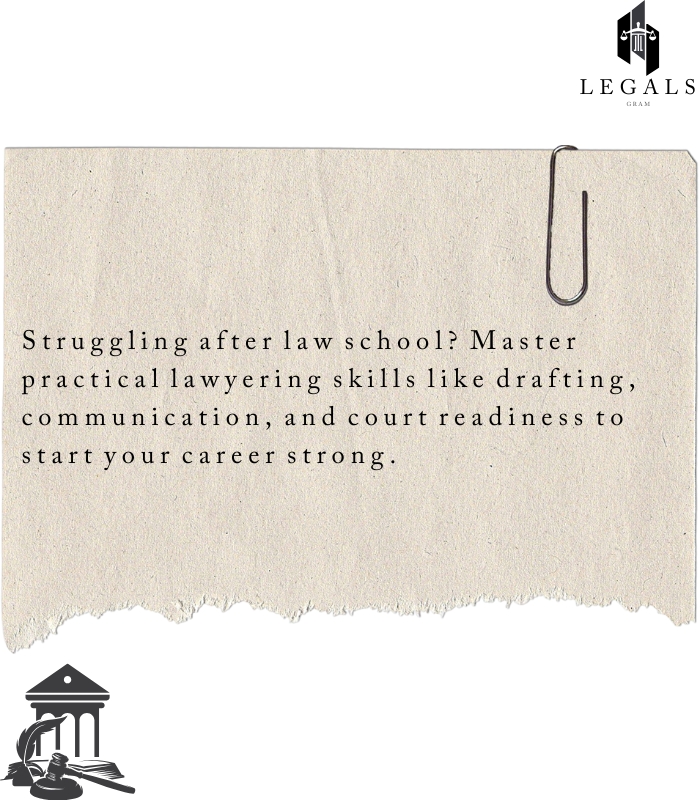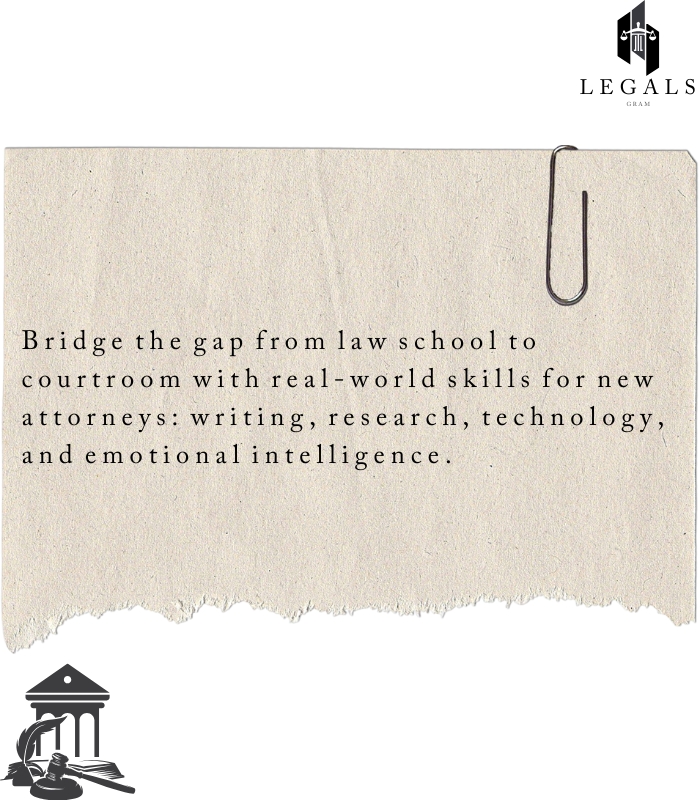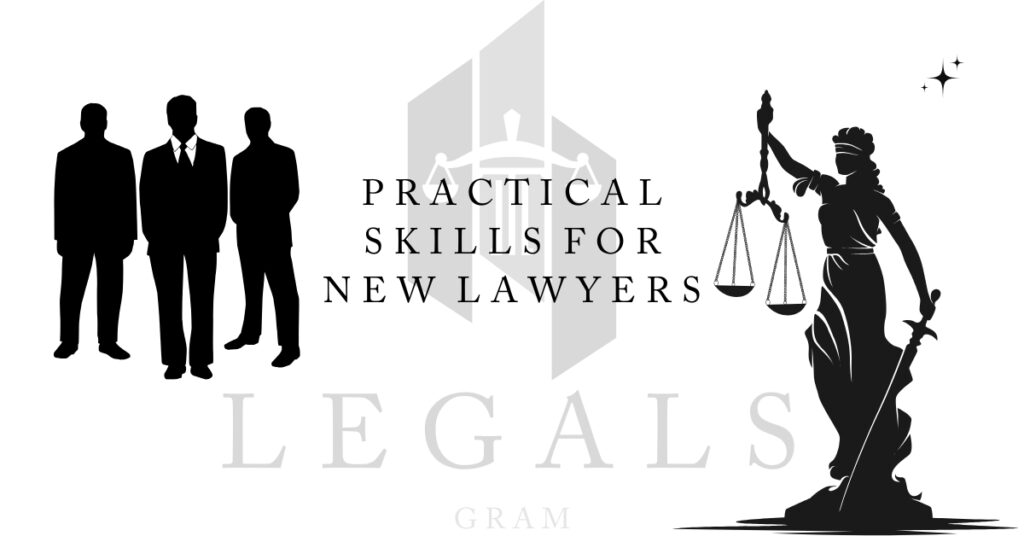Moving from law school to legal career marks the largest career transition lawyers must undergo in their professional lifetime. Most law school programs succeed at enhancing critical thinking and legal research ability but their graduates face challenges during practical legal work because they need additional abilities which they must hurriedly acquire. The extensive resource provides key information about the key abilities that convert law school achievements into workplace excellence for new law professionals.
Does law school prepare you to be a lawyer
Law school offers comprehensive education in legal concepts along with case evaluation techniques and research techniques. Recently graduated law professionals feel “practice shock” because their academic experiences do not match the realities of their legal professional work.
New attorneys displayed underpreparedness regarding aspects of practice according to the National Association for Law Placement survey from 2022 which reported 68% of respondents. Traditional legal education focuses less on instructing students about practical document writing, client interaction and business development which new attorneys consistently select as their most needed areas of knowledge.
Supreme Court Justice Sonia Sotomayor suggested that law schools instruct students on lawyer thinking rather than actual law practice methods. The differentiation between being and thinking like a lawyer becomes essential knowledge for beginning legal practitioners to master.
Essential Practice Skills for New Attorneys
1. Practical Legal Writing and Drafting
Law school writing often focuses on academic analysis and appellate brief writing. However, practice requires mastery of multiple document types with different purposes and audiences:
Client-Facing Documents
- Clearly written advice letters that translate complex legal concepts for non-lawyers
- Engagement letters that define scope of representation and fee structures
- Regular updates that keep clients informed without overwhelming them
Transactional Documents
- Contracts and agreements tailored to specific client needs
- Corporate formation documents
- Settlement agreements that protect client interests
Litigation Documents
- Discovery requests and responses
- Motions for specific procedural purposes
- Demand letters that balance assertiveness with professionalism
Skill Development Strategy: Establish a database that saves successful templates from documents you come across. Parse the language structures together with the document handling methods found within experienced legal documents of each type.
2. Client Communication and Management
Working directly with clients becomes the most dramatic professional transition between law school and practice since clients differ in their legal understanding as well as their emotional states and expectations.
Effective Client Communication Includes:
- Active listening techniques that identify underlying concerns
- Clear explanation of legal concepts without condescension
- Setting realistic expectations about outcomes, timelines, and costs
- Regular, proactive updates that prevent client anxiety
- Delivering difficult news compassionately but honestly
Skill Development Strategy: Devote five minutes to analyze client interactions for their successes and areas for improvement following every major client encounter. For learning how to handle complex client situations you can ask a mentor to observe you during interactions or participate in role-play activities.

3. Time and Workload Management
Law practice involves juggling multiple matters with competing deadlines, interruptions, and shifting priorities. This differs significantly from the more structured academic calendar.
Essential Time Management Skills:
- Realistic estimation of how long tasks actually take
- Effective calendar and reminder systems
- Strategic prioritization of urgent versus important work
- Techniques for managing inevitable interruptions
- Delegation and supervision skills
Skill Development Strategy: Document your time usage during two weeks to detect recurring problems and unproductive areas. Create an extensive scheduling system which includes scheduling time for preparations as well as meeting hard deadlines. Allow additional time for unexpected situations to occur.
4. Practical Legal Research
While law school teaches research fundamentals, practice research differs in significant ways:
- Cost-effectiveness becomes paramount when clients are paying
- Time constraints require more targeted approaches
- Practice-specific resources often replace academic sources
- Practical application takes precedence over exhaustive coverage
Skill Development Strategy: Understand all research tools available at your firm by studying their practice guides and form banks. Begin by consulting practical secondary resources which lead to primary legal authority. Make note of research duration and develop the ability to determine when additional research becomes less productive.
5. Professional Relationship Building
Legal practice is fundamentally collaborative, requiring effective relationships with:
- Colleagues within your organization
- Opposing counsel
- Court personnel and judges
- Clients and potential clients
- Support staff who can make or break your effectiveness
Skill Development Strategy: Investigating relationship development needs to be an intentional strategic focus. Specific meetings with colleagues consist of coffee or lunch sessions to understand their professional fields. Note how experienced members of your organization socialize with judicial court personnel along with opposing legal representatives. Assemble a conscious effort to develop relationships by remembering individual details about colleagues and building appropriate follow-up connections.
6. Business Development Fundamentals
Even new associates need to understand the business side of law practice:
- Understanding your firm’s business model and profitability factors
- Recognizing potential client development opportunities
- Building your professional reputation and network
- Developing industry knowledge in your practice area
- Understanding what services clients truly value
Skill Development Strategy: Participating in professional events which focus on your practice specialization will provide essential business knowledge. The trade publications which serve your clients offer valuable research sources. You should ask to join commercial pitches so you can better understand experienced attorneys’ presentation methods of their value proposition.
7. Technology Competence
Modern legal practice requires technology skills beyond what many law schools teach:
- Practice management software
- E-discovery platforms
- Document automation tools
- Electronic filing systems
- Data security best practices
- Remote collaboration tools

Skill Development Strategy: All firms should leverage vendor-provided training for platforms which they utilize. The organization should find attorneys who know their way around technology so they can teach time-saving techniques. Organizations should establish CLE training about legal technology along with other relevant courses.
Emotional Intelligence: The Multiplier Skill
Research consistently shows that emotional intelligence dramatically affects attorney effectiveness and career satisfaction. Key components include:
Self-Awareness
Recognizing personal emotions and identifying strengths together with weaknesses and reaction points assists stress management during high-pressure circumstances.
Self-Regulation
Achieving professional conduct under all circumstances involving opponents’ counsel or confrontational clients or uncooperative judges establishes fundamental standards for legal performance.
Empathy
Detailed understanding of client worries together with perspectives from colleagues and opposing counsel promotes effective negotiations that satisfies clients.
Social Skills
Legal practice demands workers to establish trusting relationships while managing conflicts with the ability to convey messages effectively throughout organizational differences.
Skill Development Strategy: You should ask others to share their impressions of your behaviors during professional exchanges. Learning to identify emotions in challenging situations must include both self and others’ emotional recognition. You should seek coaching help from specialists when particular emotional intelligence skills continue to be difficult for you.
Practical Financial Skills
Many new lawyers graduate with significant student debt and limited financial knowledge. Essential financial skills include:
- Understanding your compensation structure (billable hours, bonuses, benefits)
- Managing student loan repayment strategies
- Basic business accounting concepts
- Personal financial planning for long-term security
- Understanding law firm economics
Skill Development Strategy: Employees should use any financial wellness programs that their workplace provides. Consult a financial advisor who focuses on providing advice to legal professionals. Supervise financial information that exists in your law school career development department. How to Master Legal Writing for Court Submissions & Journals
Building Resilience and Well-Being Practices
The legal profession has higher rates of depression, anxiety, and substance abuse than most other professions. Building resilience skills from the beginning of your career is essential:
- Stress management techniques that work for you
- Boundaries between work and personal life
- Professional support networks
- Physical well-being practices
- Recognition of warning signs that indicate need for help
Skill Development Strategy: Search for senior attorneys who demonstrate good balancing of professional work and personal life. Begin your career with absolute well-being practices that you never compromise. Lawyer assistance programs must be taken advantage of when you see any signs that point to burnout or other work-related problems. The Ultimate Guide to Legal Jargon: What Every Law Student Should Learn
Learning From Feedback and Mistakes
Perhaps the most challenging transition from law school to practice is adapting to a less structured feedback environment while facing higher stakes:
- Soliciting specific, actionable feedback
- Processing criticism without defensiveness
- Learning from mistakes without excessive self-criticism
- Identifying patterns in feedback across assignments
- Implementing changes based on feedback received
Skill Development Strategy: After grading your work request brief meetings to focus on which elements you need to enhance in your next assignment. Create a journal for professional development to record all received feedback along with action plans for improvement. Understanding Complex Legal Concepts: A Simplified Guide
Creating Your Professional Development Plan
Rather than developing skills haphazardly, successful new attorneys create structured development plans:
- Self-assessment: Identify your current strengths and growth areas
- Prioritization: Focus on skills most relevant to your practice area
- Resource identification: Find specific resources, mentors, and opportunities
- Measurable goals: Establish concrete objectives for skill development
- Accountability system: Set regular review dates to assess progress
- Adaptation: Modify your plan as your role and responsibilities evolve
Skill Development Strategy: Schedule quarterly “personal CLE” time where you step back from daily tasks to assess your professional development. Create a concrete action plan for the next quarter focusing on 2-3 specific skills. The Ultimate Guide to Legal Research for Young Lawyers
Conclusion: The Continuous Learning Mindset
Newly admitted attorneys who become most successful understand professional advancement needs uninterrupted development extending throughout their entire career. Your ongoing ability to develop advanced skills throughout your career will become the main factor that determines your ultimate success as a practicing attorney. Why Choose a Legal Career? Benefits, Challenges & Expert Insights
Treatment of the disparity between preparedness at law school and practical demands should be viewed positively as a chance to create distinctive competencies which will make you stand out as a professional. Purposeful development of core competencies will help you succeed through your transition toward practice and create a sustained rewarding legal career. Stop Failing Law Exams: 10 Study Tricks You Need Right Now
Moving from law school graduate to accomplished practitioner requires ongoing development including temporary failures that lead to many important learning possibilities. Your transition from law student to practitioner will become the basis of a rewarding career through deliberate practice of essential skills combined with self-awareness and personal resilience. How To Avoid 5 Common Mistakes Law Students Make on Exams



